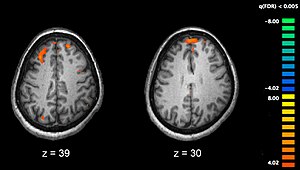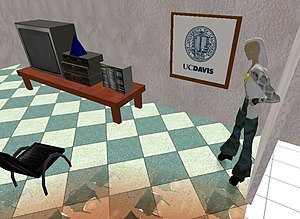| English: Image showing brain areas more active in controls than in schizophrenia patients during a working memory task during a fMRI study. Two brain slices are shown. (Photo credit: Wikipedia) |
When I worked as an emergency interventionist for the courts, I had a few clients who were diagnosed with schizophrenia. They were all non-compliant with their medications for varying reasons. This made some of my clients very scary individuals - but not all.
Schizophrenics do not all have voices in their heads telling them to "Kill her! Stab her! Hurt her!" Indeed, people with schizophrenia are not all violent towards others or themselves. But schizophrenia is fluid and changes in symptoms should be expected. This means that one never knows if the schizophrenic with whom they are interacting is safe or not.
If you are writing a plot line in any genre that includes someone driven by mental health issues, here is some information to help you develop a character with schizophrenia.
Characteristics of schizophrenia include:
* Delusions
* Hallucinations
* Disorganized speech and behavior, symptoms that cause social or occupational dysfunction.
Diagnosis can only be assessed after symptoms have been
* Present for six month
* Include at least one month of active symptoms.
Video Quick Study (1:48) real footage of a mental health schizophrenic breakdown
Link Quick Study (7:04) Aileen Wuornos killed seven men and was executed. Look at her eyes.
You can see the sclera (whites of her eyes) all the way around. This is a KEY SIGN of high stress.
| English: A schizophrenic patient at the Glore Psychiatric Museum made this piece of cloth and it gives us a peek into her mind. (Photo credit: Wikipedia) |
Schizophrenia symptoms are typically separated into 2 categories:
Positive symptoms:
Positive symptoms:
| (Photo credit: Wikipedia) |
* Delusions - believing that what other people are
saying is not true - often leading to paranoia.
This is the person who wraps their room in aluminum
foil so the microwaves can't effect them,
or thinks that the government has put tracking devices
under their skin.
* Hallucinations - Hearing, seeing, tasting, feeling, or
smelling things that others do not experience.
smelling things that others do not experience.
So for example, one of my clients presented with a
friend who happened to be a dragon. This dragon
friend who happened to be a dragon. This dragon
would fly around the ceiling. She didn't like to stand up
in her house and would often duck down and drag
in her house and would often duck down and drag
me with her because the dragon was flying around and trying to hit her with its wings. On occasion, the
dragon would become angry and frighten her; she would take all of her medications at once to make
the dragon leave her alone. She'd call me to tell me - then we had to have her stomach pumped. She
was very sweet and in my experience never caused harm to anyone else, but she was tormented by the
images - no sounds - just the very-real-to-her image of the dragon.
Video Study (14:00) TED Talk about a woman's experience with auditory hallucinations. She was not
violent or suffering - but this is her story of medical intervention.
Video Quick Study (6:36) a first person view of various hallucinations - very interesting.
Audio Quick Study (3:38) auditory hallucination simulation
Video Quick Study (9:53) schizophrenia simulation
Video Study (14:00) TED Talk about a woman's experience with auditory hallucinations. She was not
violent or suffering - but this is her story of medical intervention.
Video Quick Study (6:36) a first person view of various hallucinations - very interesting.
Audio Quick Study (3:38) auditory hallucination simulation
Video Quick Study (9:53) schizophrenia simulation
* Disorganized speech and behavior
Video Quick Link (9:22) four patients experiences various symptoms of schizophrenia talking.
Video Quick Link (9:22) four patients experiences various symptoms of schizophrenia talking.
| Messages covering the windows of a house from a patient with schizophrenia. (Photo credit: Wikipedia) |
Negative symptoms: A lack of behaviors or feelings that usually are present, such as:
* Losing interest in everyday activities, like bathing, grooming, or getting dressed. Many of our homeless
have this attribute.
* Feeling out of touch with other people, family, or friends
* Apathy - Lack of feeling or emotion.
* Having little emotion or inappropriate feelings in certain situations
* Having less ability to experience pleasure
* Feeling out of touch with other people, family, or friends
* Apathy - Lack of feeling or emotion.
* Having little emotion or inappropriate feelings in certain situations
* Having less ability to experience pleasure
Notice that many of the NEGATIVE symptoms mimic depression. LINK to Depression for Writers
I was recently listening to the blogger/writer from a blog I read who was speaking on NPR. She was diagnosed with depression and was discussing her episode. She said that her anti-depressants were helping. But to my ear, boy did she sound like she was exhibiting negative signs of schizophrenia. She described her utter lack of emotion. The only piece that prevented her suicide was the idea that her husband would find her body. This was the only feeling she could conjure up. Depression and schizophrenia diagnoses often overlap.
* Schizophrenia affects different people differently and
symptoms can vary from person to person.
I was recently listening to the blogger/writer from a blog I read who was speaking on NPR. She was diagnosed with depression and was discussing her episode. She said that her anti-depressants were helping. But to my ear, boy did she sound like she was exhibiting negative signs of schizophrenia. She described her utter lack of emotion. The only piece that prevented her suicide was the idea that her husband would find her body. This was the only feeling she could conjure up. Depression and schizophrenia diagnoses often overlap.
| weird place! tries to reproduce what it's like to have Schizophrenia. Don't stay in there too long. (Photo credit: Wikipedia) |
symptoms can vary from person to person.
* Some people may have many symptoms, while others
may only have a few.
* Men diagnosed with schizophrenia usually start to
show symptoms between their late teens and early
20s.
* Women usually develop symptoms during their
mid-20s to early 30s. LINK
may only have a few.
* Men diagnosed with schizophrenia usually start to
show symptoms between their late teens and early
20s.
* Women usually develop symptoms during their
mid-20s to early 30s. LINK
It used to be that schizophrenia had sub-types like paranoid schizophrenic, but in the the new DSM V (the psychiatric bible) these have been done away with because the illness is so fluid and changeable that these specifications were not helpful to the treatment. They are now noted as displayed symptoms.











